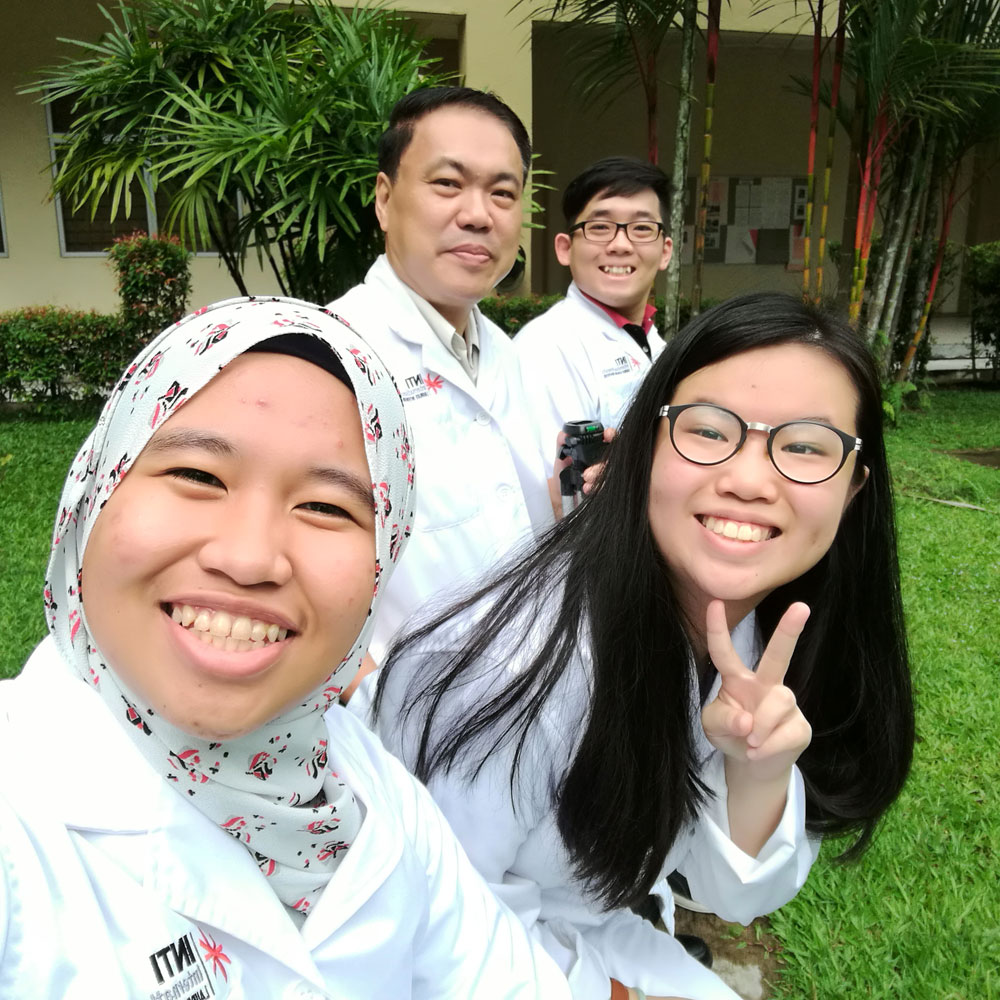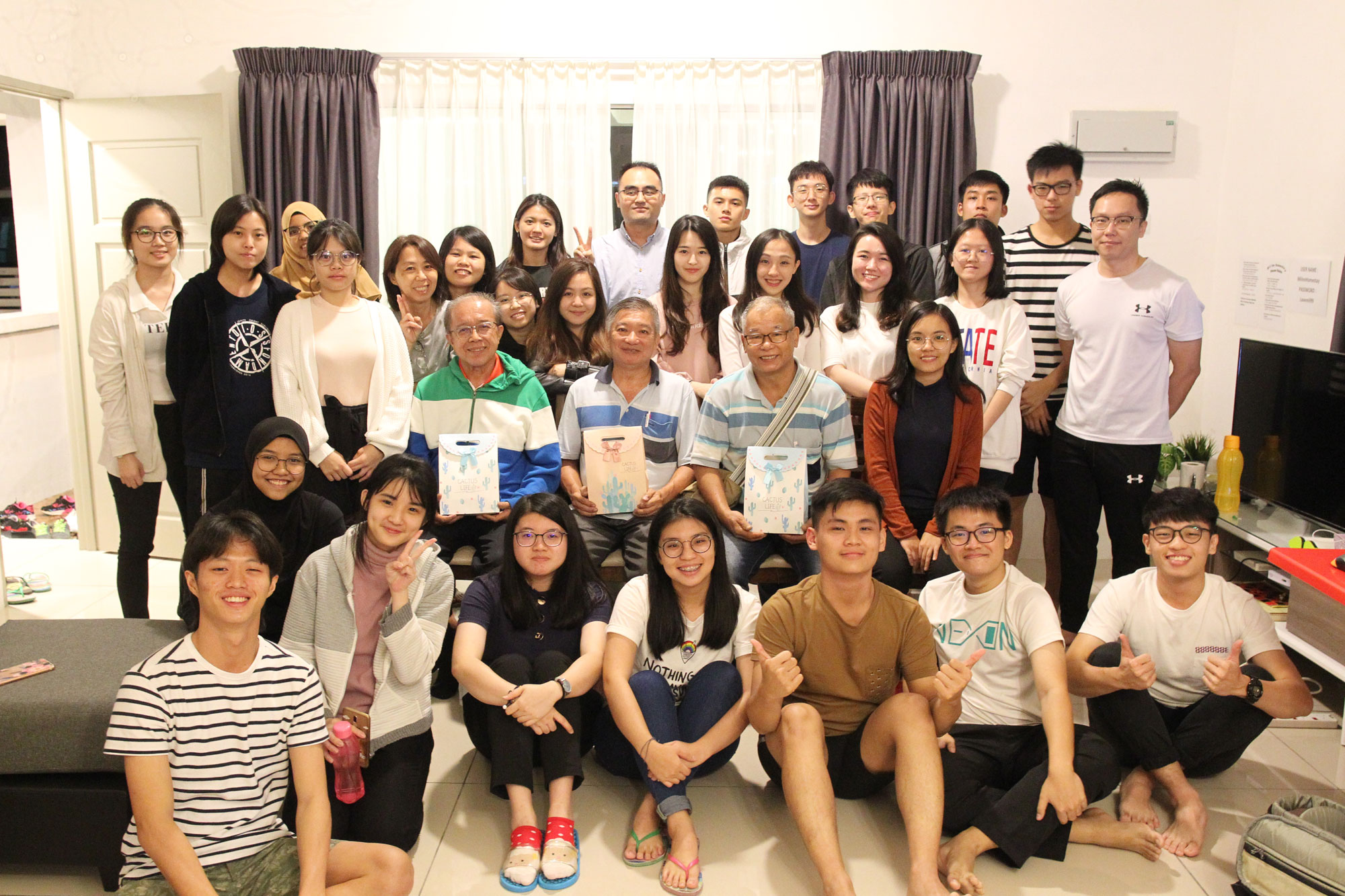With traditional Chinese medicine gaining popularity around the world, so has interest among local students. Though Traditional Chinese Medicine (TCM) programmes have a predominantly Chinese student population, the ancient craft is now seeing enrollment from students of other races.
INTI International University Bachelor in Traditional Chinese Medicine student, Wan Amirah Aminah Wan Mohd Nizam (front), with her classmates and lecturer.
For Wan Amirah Aminah Wan Mohd Nizam, Lily Qarmila Mohd Lotffee and Hadijah Sofia Badrul Hisham, Malay students who are currently pursuing the Bachelor of Traditional Chinese Medicine programme at INTI International University, they shared a similar curiosity for TCM treatments as well as a similar goal.
Wan Amirah, who is the most senior of the three, said it all started with a Chinese movie for her.
“I’d actually never heard of TCM when I was small, but I was watching a Chinese movie one day and there were scenes where acupuncture was used to treat a patient. I’ve been curious about it ever since!” said the Semester 7 student excitedly.
Having attended a national secondary school, Wan Amirah was not equipped with the language essential for the course. The first challenge she had to overcome was mastering Mandarin, cramming eight hours of language class per week. With no basic training, she took intensive language classes at night for four semesters. Because of her concern of not being able to communicate with her classmates and being left behind in her studies, she put in the extra effort to catch up.
“I kept pushing myself to learn and whatever extra time I had would be spent on practicing and memorizing Chinese characters. I also watched more Chinese dramas and listened to Chinese songs to help improve my language, and I can’t forget how all my lecturers continuously encouraged me to keep going,” she added.
INTI International University Bachelor in Traditional Chinese Medicine student Lily Qarmila Mohd Lotffee (front row, second from left) with TCM students at a charity treatment event.
Despite the challenge of language, Wan Amirah was adamant to one day successfully provide relief and treatment to future patients and also to change the misconceptions that some people have about TCM.
“I remember attending a TCM charity treatment event we had at a shopping mall. A Malay lady came up to me and asked about the ingredients we used for treatment. She had thought that TCM herbs and prescriptions contained alcohol and traces of pork. I also have relatives who are skeptical about the efficacy of these alternative treatments,” she recounted.
To her, being one of the few Malays taking TCM meant that she would soon be able to communicate better with patients from the Malay community on treatment options and advantages.
For Hadijah Sofia, who attended a Chinese elementary school, communication was not a problem, but the saturated syllabus left her struggling as she tried to balance her study load and club activities.
“My first semester was rough. In between my night classes to refresh and improve my language, I was also not prepared for the amount of work from classes and workshops. Luckily for me, I have lecturers who listened to my problems and offered me advice on how I could improve not only my grades, but also manage life in university,” said Hadijah Sofia, adding that there would be new challenges each semester but the way to go about it was to stay positive, seek help when needed, and just enjoy the journey.
The Semester 5 student recalled how she had often made visits to INTI’s TCM Clinic when she was doing her foundation at the university and she was amazed at how TCM practice differed from modern medicine. She said the more visits she made to the clinic the more intrigued she was by the practice.
Hadijah Sofia hopes to be of service to a hospital, clinic or the Malaysian Chinese Medical Association (MCMA) after graduation and then possibly follow the footsteps of her seniors and get her Master’s degree in China. She also dreams of setting up her own practice.
For Semester 3 student Lily Qarmila, having two seniors to offer tips and advice was an advantage. Like Hadijah Sofia, she had learned Mandarin in school but admitted that though she had learned basic Mandarin during her school years, there were words and phrases that she did not understand, which made learning difficult.
“I had to memorize a whole lot of herbs and formulas I had never heard of before and I had to do so in Mandarin. To know the herbs is one thing, but you also had to know their properties and what ailments it could treat too. One of my Malay seniors came to the rescue and shared with me tips on how to remember these things,” she laughed.
Lily Qarmila shared that being a Malay student in the TCM programme gave her the opportunity to widen the perspective of TCM to the community, especially fellow Malays who may have doubts on the approach used by alternative medicine.
“In acupuncture, for example, we use the meridian to find acupressure points and what it can treat, but the meridian itself is an invisible pathway, not the nerve pathway or blood circulation pathway. As for the herbs used, I’ve had relatives ask whether only plants are used or if insects or animal skin are involved too. They question the halal status of the items used for treatment,” she explained.
She added that the best part of being a TCM student was the real clinical experience offered, even as a junior in Semester 2.
“INTI’s TCM programme allows us to partake in clinical sessions and charity treatment events which are fun and a great experience. Not only do I learn how to work as a team, but it also teaches me communication and practical skills,” she concluded.

